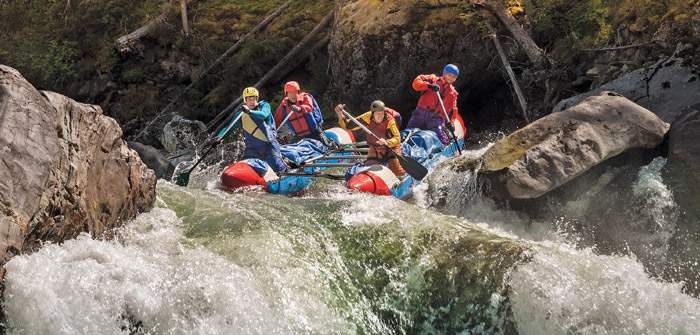(Photo | Courtesy of CrossPointe Capital)
As a business owner, you probably spend a lot of time negotiating, whether with vendors, customers, creditors, landlords, or employees. Therefore, negotiating is one of the most important skills for an entrepreneur to refine.
Negotiating is one of those words that unfortunately has often come to be construed as meaning “figuring out how to get my way, no matter the cost.” Tons of books have been written about negotiating. Many of them focus on manipulative tactics or hard-nosed, hip-shooting techniques that you’re supposed to use to beat the other guy. Most of this stuff is useless or detrimental.
Even if a particular technique has merit, it’s usually impossible for most of us to remember it unless we use it all the time. Fortunately, there are better and more effective ways to think about negotiating.
After thousands of negotiations over the years, and spending countless hours in kayaks, drift boats and rafts, I have found it more useful to think of negotiating like navigating a whitewater rapid. There are more similarities between big whitewater and big deals than you might initially think.
Big rapids have waves, rocks, trees, and incredible pressures and stresses that can flip your boat and keep you from getting through safely. You don’t “beat” the river, you don’t beat rocks, trees and swift currents. You negotiate them. Likewise, big deals have incredible pressures, stresses and obstacles that can rock or flip your business “boat.” You don’t beat them. They have to be negotiated.
Here are five lessons from the river I keep learning to apply in business. Reflect on them as you consider your own negotiating situations.
- Pay Attention to the River. A river has its own agenda. It will go where it goes. You can’t re-direct it. Ignore the river’s objectives at your risk. Like the river, people with whom you negotiate have their own agenda. Unlike the river, you may be able to re-direct people…if you are properly prepared. Even if you cannot re-direct them, you can certainly work with their agenda in order to reach a successful outcome. But it takes preparation. Before you enter negotiations, consider what the other party’s objectives are. In what direction are they headed? Where are the powerful currents? How can you get where you want to go by working with, instead of fighting those currents? For river runners, pay attention to the river. For sellers, put yourself in the mind of the buyer. For buyers, put yourself in the mind of the seller. The key word is — Empathy.
- Know Where You Want to Go. Entering a rapid without a clear idea of your objective leads to disaster. There are places you can “go with the flow,” and places you must paddle hard to reach safety. But it’s imperative to know where you want to end up. In negotiating, if there are points that are critical to you, be very clear about them in advance so you know when to “dig in.” Likewise, figure out in advance where you can “go with the flow” and let the other side have their way without significant cost to you. Make sure you have a clear picture of where you want to end up. The key word is — Goal.
- Enter Strong. How you enter a rapid has a lot to do with how you exit. If you hit the right entry points and develop positive momentum, you’ll be positioned well for the rough stuff. Similarly, in negotiations, get positive momentum early by finding areas of easy agreement. Build a collaborative mood and the more difficult points get easier to handle. There are obviously exceptions to this. Sometimes there is no easy water and there are no easy points. You just have to plunge in and dig. Usually, though you can delay your entry long enough to plan properly, get lined up and enter strong. The key word is — Momentum.
- Keep Your Eyes on the Prize. Once you are in a rapid, it’s easy to get so involved fighting each foot of turbulence that you lose sight of your overall objective. One secret of successful river runners is that they always focus on where they want to go, not on where they are. In every sport I know, your body follows your eyes. What you focus on, is what you’re most likely to get. The same is true with negotiations. Don’t get distracted by minutia. Keep your head up and look to the desired outcome. The key word is — Focus.
- Be Prepared to Walk. Some rapids are too tough to run. Occsionally, the water rises unexpectedly, and a normally easy stretch becomes ferocious. The risks of attempting to run it are simply not worth the rewards. Instead of trashing yourself and your boat, just portage — walk around it. Sometimes it’s better to live to float another day. The same is true with deals. Some deals just aren’t worth trying to make and some negotiations are not worth the effort. Know when it makes sense to walk. If you decide in advance the conditions under which you’ll have to walk, it will make it easier to get out of the boat and avoid being pummeled in the rocks. The key word is — Common Sense.
Best wishes for your next negotiation. Plan well, prepare properly, paddle smart and keep your eyes on the prize.
Michael Sipe is a Mergers and Acquisitions advisor at crosspointecapital.com, Executive Coach and Republican Candidate for State Representative HD53.





